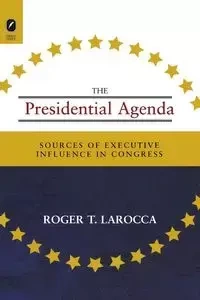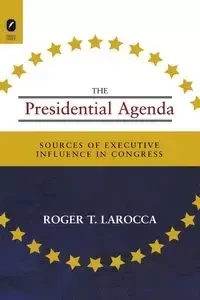PRESIDENTIAL AGENDA - ROGER LAROCCA T
PRESIDENTIAL AGENDA - ROGER LAROCCA T
- SOURCES OF EXECUTIVE INFLUENCE IN CONGRESS
AutorzyROGER LAROCCA T
It is well understood that the president is a powerful agenda-setting influence in Congress. But how exactly does the president, who lacks any formal power in early stages of the legislative process, influence the congressional agenda? In The Presidential Agenda, Roger T. Larocca argues that the president's agenda-setting influence arises from two informal powers: the ability to communicate directly to voters and the ability to control the expertise of the many executive agencies that advise Congress on policy.
Larocca develops a theoretical model that explains how the president can raise the public salience of issues in his major addresses, long accepted as one of the president's strongest agenda-setting tools. He also develops a theoretical model that explains how control over executive agency expertise yields a more reliable and persistent influence on the congressional agenda than presidential addresses.
The Presidential Agenda tests these theoretical models with an innovative empirical study of presidential agenda setting. Using data from all House and Senate Commerce Committee bills from 1979 to 2002, Larocca converts information about bills into information about policy issues and then traces the path of presidential influence through the committee and floor stages of legislative consideration.
Larocca develops a theoretical model that explains how the president can raise the public salience of issues in his major addresses, long accepted as one of the president's strongest agenda-setting tools. He also develops a theoretical model that explains how control over executive agency expertise yields a more reliable and persistent influence on the congressional agenda than presidential addresses.
The Presidential Agenda tests these theoretical models with an innovative empirical study of presidential agenda setting. Using data from all House and Senate Commerce Committee bills from 1979 to 2002, Larocca converts information about bills into information about policy issues and then traces the path of presidential influence through the committee and floor stages of legislative consideration.
EAN: 9780814255391
Symbol
981GFP03527KS
Rok wydania
2019
Oprawa
Miekka
Format
15.2x22.9cm
Język
angielski
Strony
218

Bez ryzyka
14 dni na łatwy zwrot

Szeroki asortyment
ponad milion pozycji

Niskie ceny i rabaty
nawet do 50% każdego dnia
Niepotwierdzona zakupem
Ocena: /5
Symbol
981GFP03527KS
Kod producenta
9780814255391
Rok wydania
2019
Oprawa
Miekka
Format
15.2x22.9cm
Język
angielski
Strony
218
Autorzy
ROGER LAROCCA T

It is well understood that the president is a powerful agenda-setting influence in Congress. But how exactly does the president, who lacks any formal power in early stages of the legislative process, influence the congressional agenda? In The Presidential Agenda, Roger T. Larocca argues that the president's agenda-setting influence arises from two informal powers: the ability to communicate directly to voters and the ability to control the expertise of the many executive agencies that advise Congress on policy.
Larocca develops a theoretical model that explains how the president can raise the public salience of issues in his major addresses, long accepted as one of the president's strongest agenda-setting tools. He also develops a theoretical model that explains how control over executive agency expertise yields a more reliable and persistent influence on the congressional agenda than presidential addresses.
The Presidential Agenda tests these theoretical models with an innovative empirical study of presidential agenda setting. Using data from all House and Senate Commerce Committee bills from 1979 to 2002, Larocca converts information about bills into information about policy issues and then traces the path of presidential influence through the committee and floor stages of legislative consideration.
Larocca develops a theoretical model that explains how the president can raise the public salience of issues in his major addresses, long accepted as one of the president's strongest agenda-setting tools. He also develops a theoretical model that explains how control over executive agency expertise yields a more reliable and persistent influence on the congressional agenda than presidential addresses.
The Presidential Agenda tests these theoretical models with an innovative empirical study of presidential agenda setting. Using data from all House and Senate Commerce Committee bills from 1979 to 2002, Larocca converts information about bills into information about policy issues and then traces the path of presidential influence through the committee and floor stages of legislative consideration.
EAN: 9780814255391
Niepotwierdzona zakupem
Ocena: /5
Zapytaj o produkt
Niepotwierdzona zakupem
Ocena: /5
Napisz swoją opinię

